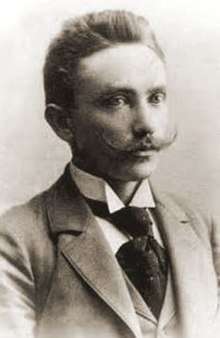Filaret Kolessa
Filaret Mykhailovych Kolessa (Ukrainian: Філарет Михайлович Колесса) (1871 – February 4, 1947) was a Ukrainian ethnographer, folklorist, composer, musicologist and literary critic. He was a member of the Shevchenko Scientific Society from 1909, The Free Ukrainian Academy of Sciences from 1929, and the founder of Ukrainian ethnographic musicology.

Biography
Filaret Mykhailovych Kolessa was born in the village of Tatarsk (now the village of Pishchane, Lviv oblast). He studied at the University of Vienna under Anton Bruckner from 1891 to 1892 and completed his studies at the Lviv University in 1896. Filaret taught in high schools in Lviv, Stryi, and Sambir. He worked with Ivan Franko, Mykola Lysenko, Lesia Ukrainka. In 1918 he defended his dissertation at the University of Vienna and received the title Doctor of Philology. He studied the rhythms of Ukrainian folk songs of Galicia, Volhyn and Lemkivshchyna. From 1939 he was a professor at the Lviv University, from 1940 the director of the State museum of Ethnography in Lviv, director of the Lviv section, of the Institute for Art studies, Folklore and Ethnography of the Academy of Sciences of the Ukrainian SSR (from 1940), and a participant at international conferences of musicologists and philologists at Prague, Warsaw, Vienna, and Antwerp.
Filaret Kolessa died on February 4, 1947. He was buried in Lviv.
Family
Filaret had a brother named Oleksander. He was also the father of Mykola Kolessa and the uncle of Lubka Kolessa.
Main works
- "Огляд українсько-руської народної поезії" (1905), A study in Ukrainian_Ruthenian folk poetry.
- "Ритміка українських народних пісень" (1906–07), The rhythm of Ukrainian folk songs
- "Мелодії українських народних дум" (1910–13), Melodies of Ukrainian folk dumy
- "Наверстування і характерні признаки українських народних мелодій" (1913–14), Structure and characteristics of Ukrainian folk melodies
- "Українські народні думи у відношенні до пісень, віршів і походження голосінь" (1920–21), Ukrainian folk dumy and their relationship to songs, poems and funeral laments.
- "Про генезу українських народних дум" (1921), The genesis of Ukrainian folk dumy.
- "Народні пісні з південного Підкарпаття" (1923), Folk songs of southern Subcarpathia.
- "Речитативні форми в українській народній поезії" (1925), Recitative forms in Ukrainian folk poetry.
- "Українські народні пісні на переломі 17–18 ст." (1928), Ukrainian folk songs at the turn of the 17–18th centuries.
- "Народні пісні з галицької Лемківщині" (1929), Folk songs from Galicia.
- "Українська усна словесність" (1938),Ukrainian oral traditions
- "Народні пісенні мелодії українського Закарпаття" (1946). Folk song melodies of the Ukrainian Carpathians
Author of numerous choral works and arrangements of Ukrainian folk. Manuscript on the "History of Ukrainian ethnography" is still unpublished.